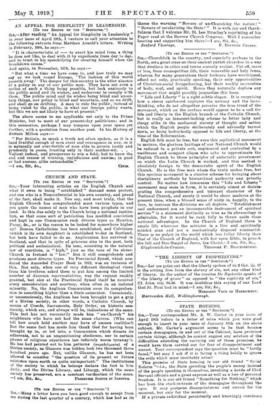CHURCH AND STATE.
(To TEL EDITOR 07 THE " SPECTATOR.") SIR.—Your interesting articles on the English Church and what it owes to being " establiehed " demand some protest, and one who is a Nonconformist in his own country, and proud of the fact, shall make it. You say, and most truly, that the English Church has comprehended most various types, and you quote the names of men who have been prophets in our land. Is this due solely to the Church being a national institu- tion, so that some sort of patriotism has modified conviction and kept in one Communion such diverse types as Maurice, Pusey, &c., or is the reason to be looked for somewhere higher up? Roman Catholicism has been established, and Calvinism (which is its own daughter) is established to-day in Scotland, but both have failed to do so. Anglicanism has survived in Scotland, and that in spite of grievous sins in the past, both political and ecclesiastical. Its tone, according to the natural law of reactions, is "high," just as the tone of its mister- Church in Ireland is "low." But it etill comprehends and produces most diverse types. Its Provincial Synod, which pro- duced the Amended Prayer Book in 1912, was an instance of this. Not only, when one of very different theological views from his brethren asked them to put him among the limited number of diocesan representatives, was the request readily granted, but also- at the Provincial Synod itself he received every consideration and courtesy, when often in an isolated minority. No, the Anglican Communion owes its coraprehete Mon to something higher than a State connexion. Consciously, or unconsciously, the Anglican has been brought to get a grip of a Divine society, in other words, a Catholic Church, by means of Creeds, Sacraments, Holy Order, an historic eon- tinuity, which are, and always will be, indications of the same. This fact has not necessarily made him " un-Ohureh " his neighbours who have not had the same chances. (Who can tell how much hold another may have of unseen realities?) But the same fact has made him thank God for having been brought np in, or led into. a Communion which directs its adherents, not to an unquestioning obedience, nor to certain phases of religions experience (an infinitely worse tyranny:). He has had pointed out to him patterns (supaorlypara) of a . Divine society, as Glancon was bidden look two thousand three hundred years ago. But, unlike Glaueon, he has not been allowed to consider " the question of its present or future existence upon earth as quite unimportant" The institutions of the society to which he belongs declare the fact to him daily, and the Divine Library, and Lit-arta, which the same society has preserved, are a constant verification of the same.


































 Previous page
Previous page